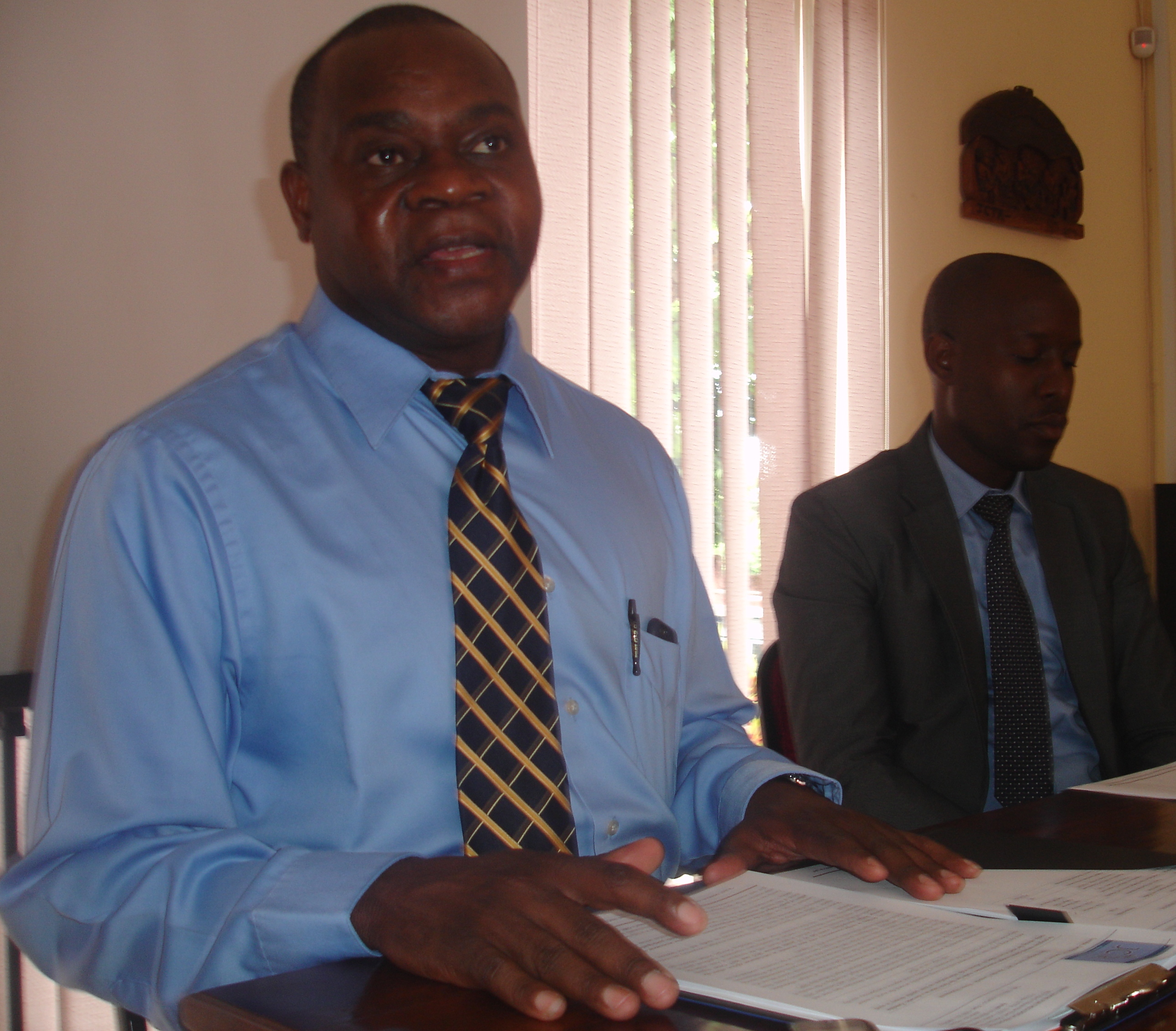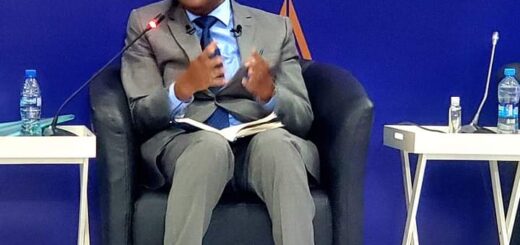Open Budget Survey 2017 Results Launch – Press Statement Lusaka, Zambia, Wednesday 31st January, 2018
Notice: Undefined index: catFilterList in /home/zambi/public_html/wp-content/plugins/wp-likes/api.php on line 243

JESUIT Centre for Theological reflection (JCTR) Executive Director Father Emmanuel Mumba with National Planning Ministry Principal Planner Joseph Musonda pix by Derrick Sinjela
As progress toward global budget transparency stalls for the first time in a decade, Zambia ranks among the least in providing its citizens with information on how public money is used
Amid declining public trust in government and increasing inequality around the world, a major independent global report finds that the government of Zambia could improve transparency quickly, with little cost or effort.
Many governments around the world are making less information available about how they raise and spend public money. Zambia based on information assessed between July 2015 and December 2016 was rated among the least transparent with regard to their national budget, according to the results of the Open Budget Survey 2017 (OBS), conducted by the International Budget Partnership (IBP).
After 10 years of documenting steady progress in increasing the availability of budget information, IBP says the OBS 2017 showed a modest decline in average global budget transparency scores, from 45 in 2015 to 43 in 2017 for the 102 countries that were surveyed in both rounds (scores are out of a possible 100). This is in stark contrast to the average increase of roughly two points documented among comparable countries in each round of the OBS between 2008 and 2015. The reversal of transparency gains is particularly discouraging given that roughly three-quarters of the countries assessed do not publish sufficient budget information (a score of 61 or higher).
Overall, declines in budget transparency were most dramatic in sub-Saharan Africa, where the average budget transparency scores fell by 11 points between 2015 and 2017. Other regions experienced small increases or small declines in their scores, with the exception of Asia, where the average score rose more substantially. A number of countries have experienced significant gains in transparency since they were first included in the survey, including Georgia, Jordan, Mexico and Senegal.
Warren Krafchik, executive director of IBP, said, “The declines in budget transparency are worrisome against a global backdrop of rising inequality, restrictions on media and civic freedom, and a weakening of trust between citizens and their governments.”
Launched in 2006, the OBS is the world’s only independent, comparative assessment of the three pillars of public budget accountability: transparency, oversight and public participation. The sixth round of this biennial assessment, the 2017 survey evaluated 115 countries across six continents, adding 13 new countries to the survey since the last round in 2015.
Zambia has been in the OBS since 2006, and the 2017 survey finds that it is falls below almost all the other countries on the Open Budget Index, or OBI, which uses internationally recognized criteria to give each country a transparency score on a 100-point scale. Zambia’s OBI score of 8 means that citizens have little or no access to the budget information they need to understand the budget and hold the government to account. This matters because budgets are the main tool governments use to set policies for raising and spending public funds, which promote development and meet the needs of the country’s people.
Zambia’s score of 8 on the 2017 OBI score falls substantially lower than its score in 2015 (39). It is observed that the country’s score has in part been affected by the change in the definition of “publicly available” which from OBS 2017 only recognizes those documents that are published online on an official government website as available to the public. Online availability is now considered a basic standard for the publication of government information because it affords the public a reliable and direct link to information at a minimal cost. Zambia thus no longer received credit for the production of the Executive’s Budget Proposal, which was not available in its entirety on the Ministry of Finance’s website as the link available did not function during the research period even though hard copies were available. It was also noted that, the government has been inconsistent regarding documents it makes publicly available in any given year.
During the research period, Zambia decreased the availability of budget information by producing the Year-end reports for internal use only, not producing the Pre-Budget Statement and failing to make available in a timely manner the Mid-year Review Budget documentation. To improve budget transparency, the Zambian government needs to be consistent in making publicly available the eight Key budget documents through their official website. Publication of budget documentation and guidelines on when this should be done, further needs to be backed by legislation such as the Planning and Budgeting Bill which has taken over 4 years to be presented to parliament and is yet to be enacted.
The OBS 2017 also revealed that most countries fail to provide meaningful opportunities for the public to participate in the budget process — both to inform decisions about how government raises and allocates funds and to hold government accountable for implementing those decisions. Not a single country out of the 115 surveyed offered participation opportunities that are considered adequate (a score of 61 or higher). The average global score is just 12 out of 100,with 111 countries having weak scores (lower than 41). Zambia’s score of 15 out of 100 indicates that there are few opportunities provided by the Ministry of Finance (12), Parliament (33) and the Office of the Auditor General (0) for the public to participate in the budget process. Without opportunities for citizens’ active participation — particularly citizens from marginalized or vulnerable groups — budget systems may only serve the interests of powerful elites.
The Government, Parliament and the Office of the Auditor General (OAG) need to ensure that the public is not only aware of the procedures of the national budgeting process, but should also actively seek submissions from the public during the proposal, implementation and oversight stages of the budget process. These three institutions also need to provide feedback and reports on the submissions made to ensure that it is a two way communication. The OAG needs to establish formal mechanisms for the public to assist it in formulating its audit program and to participate in relevant audit investigations (for example, through social audits or value for money surveys). Further these channels of engagement need to be backed by law to ensure consistent provision of spaces for engagement with the public and active participation of citizens
In addition to assessing transparency and participation, the OBS also evaluated the role of formal oversight institutions, such as supreme audit institutions and legislatures. The survey found that only 32 countries’ legislatures (28 percent) have adequate oversight practices, 47 countries (41 percent) have limited oversight practices, and 36 countries (31 percent) have weak oversight practices. In comparison, the OBS finds that in 75 out of 115 countries (65 percent) the basic conditions for OAGs to provide adequate oversight are in place. Well-funded and independent oversight institutions are critical to better budget planning and implementation.
With regard to the strength of Zambia’s formal oversight institutions, the score for the Parliament (legislature) and the Office of the Auditor General was 48 which showed that the two institutions provided limited oversight of the budget. Specific scores for the two institutions showed that the OAG provided adequate budget oversight while Parliament provided weak budget oversight. It is commendable that in the Constitution of Zambia Amendment Act (2016), the law provides the Office of the Auditor General with full discretion to undertake audits it sees fit. It also provides that the appointment of the head of the OAG based on a recommendation of the State Audit Commission and has to be ratified by parliament, which bolsters independence of the institution. Despite this, the recommendations made by this office and the follow up measures that could reduce wastage of public resources tend not to be acted upon. To improve oversight and thus the oversight score, budget policy contained in the Medium Term Expenditure Framework (MTEF) needs to be debated prior to Presentation of the Budget Speech to parliament by the Minister of Finance. Further, the sector legislative committees need examine and publish reports on in-year budget implementation online. The government and legislature also have to ensure that funding to the newly established Independent Fiscal Institution is adequate and not reliant on international donors and publish its reports and analyses online.
The potential threat that Zambia’s lack of strong budget accountability systems and practices poses to our ability to achieve our development goals is of great concern. The government should take the following steps toward rapid improvement
1. Publishing the eight key documentation on the respective official government websites in a timely manner
2. Enacting both the Planning and Budgeting Bill and the Public Finance Management Bill within 2018 which should provide for citizens participation and strengthen budget oversight respectively.
Globally, the news is not all bad this round. There have been several advances toward more open budgets. While the number of publicly available budget documents decreased in this round of the survey compared to 2015, published documents contain slightly more information now than they did in previous years. Though overall global transparency has declined from 2015, the level of transparency in 2017 remains above where it was a decade ago.
“Transparency scores in this round of the survey show that any government, irrespective of region or culture, can become more transparent,” said Krafchik. “The vast majority of countries in the world could quickly improve transparency by making documents they already produce publicly available. Most countries that produce documents that they are not publishing on their official websites already publish other documents online, so they could easily do so for all documents.”
For the full report, including recommendations, and other resources, such as country-specific results, please visit www.openbudgetsurvey.org.





















